November 2023

Message from the Dean: Welcoming New People, Spaces, and Initiatives
As the Northeastern University Library continues to grow and evolve, it is always a pleasure to let you know about the latest developments. New people, new spaces, and new initiatives have furthered our overall mission of helping our community of students, faculty, and many members of the public who value our resources, expertise, and support.
Here in Boston, we are thrilled to have recently reopened two floors of Snell Library following their renovation. Completely refreshed areas for focused studying and lively collaboration are now available, and our expanded zone for Archives and Special Collections is welcoming researchers once again.
After a year of integration, the F. W. Olin Library on Northeastern’s campus in Oakland, Calif., is fully part of our system, with supportive services and collections for our students and instructors on the West Coast. And we gained a librarian colleague in London this year as well!
This blossoming of our library network is connecting all Huskies, and we couldn’t be happier to join hands with learners and teachers across the globe.
Dan Cohen
Dean of the Library
Enjoy these glimpses of the newly renovated 4th floor of Snell Library:
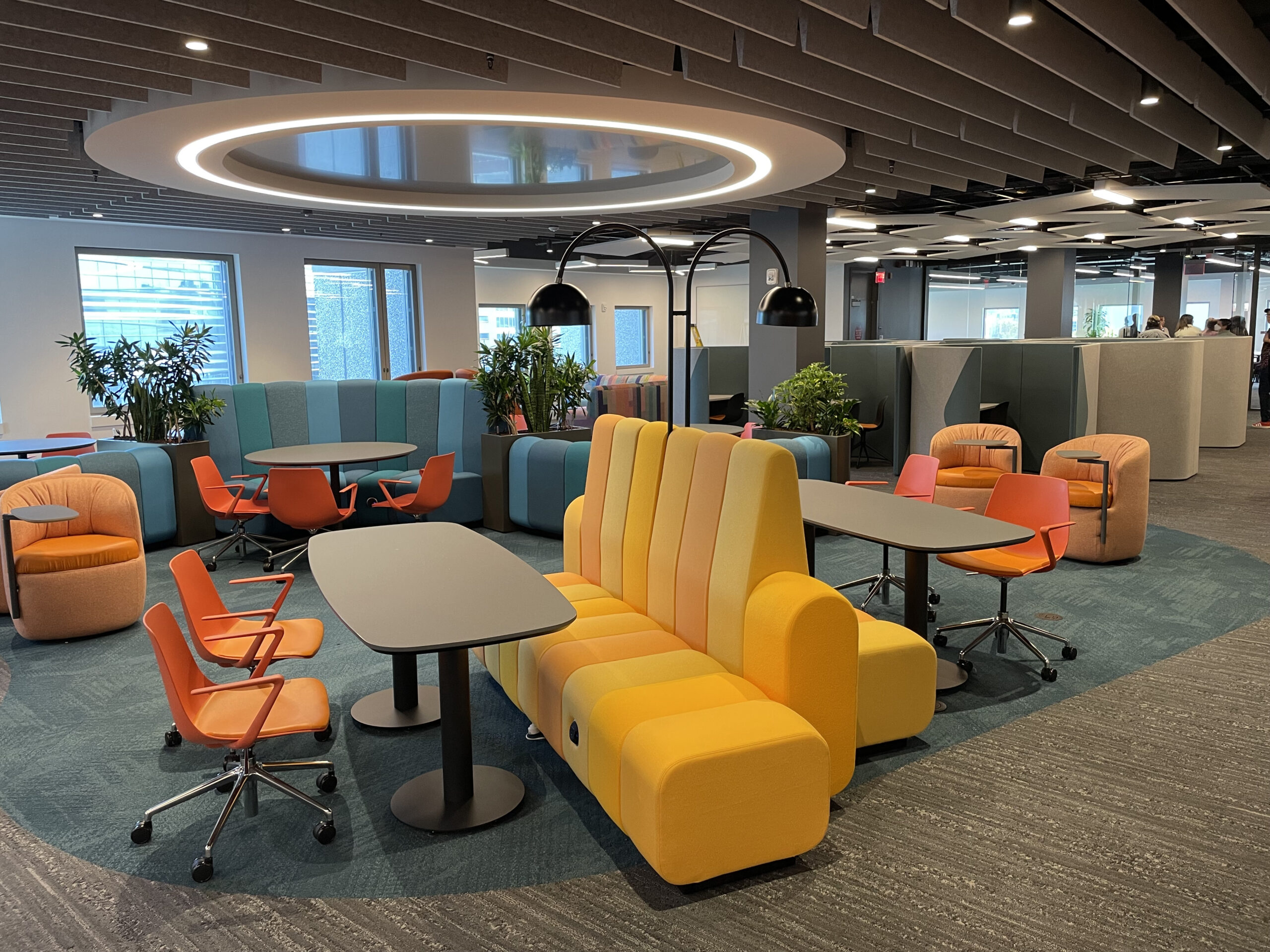
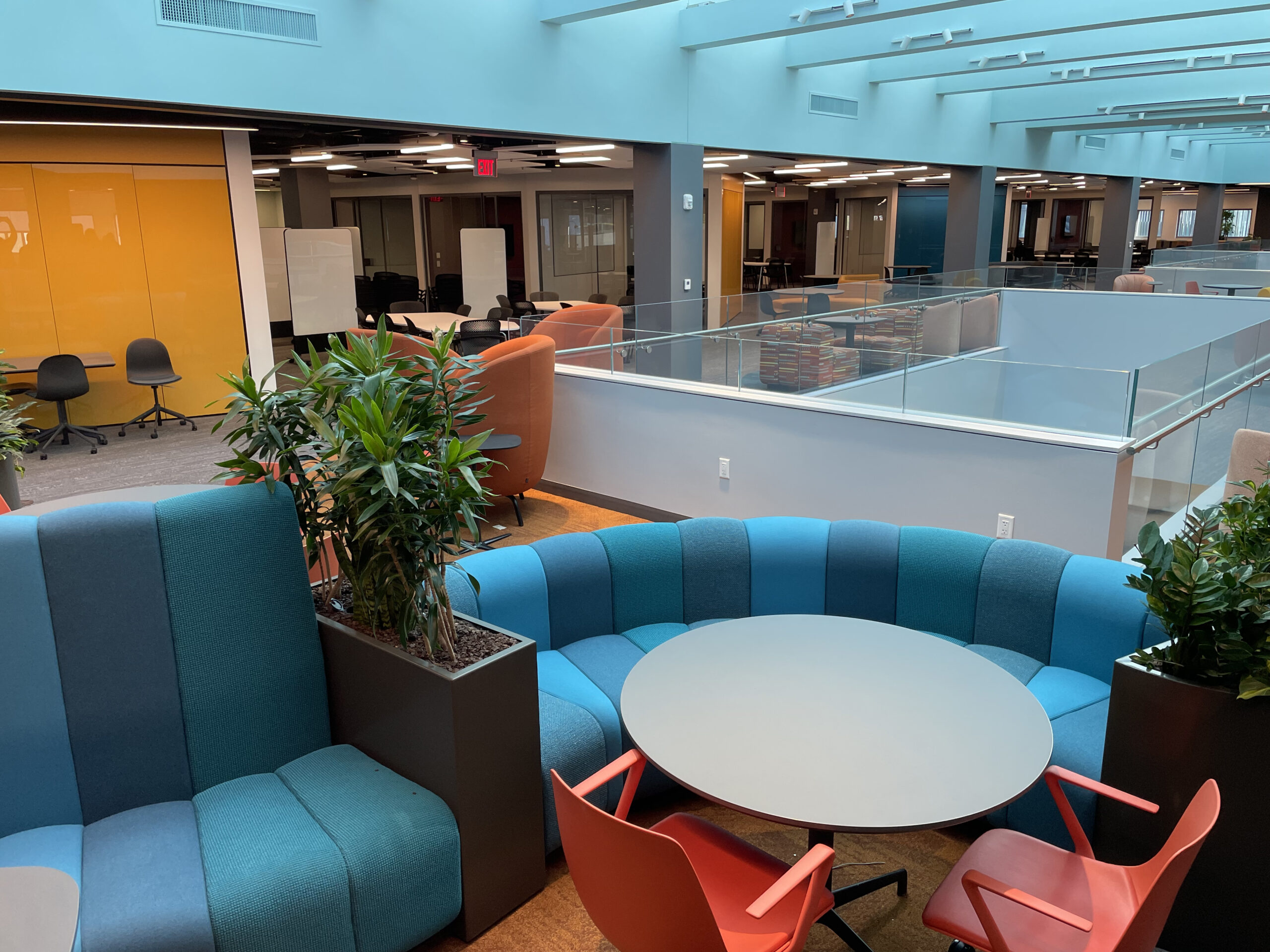
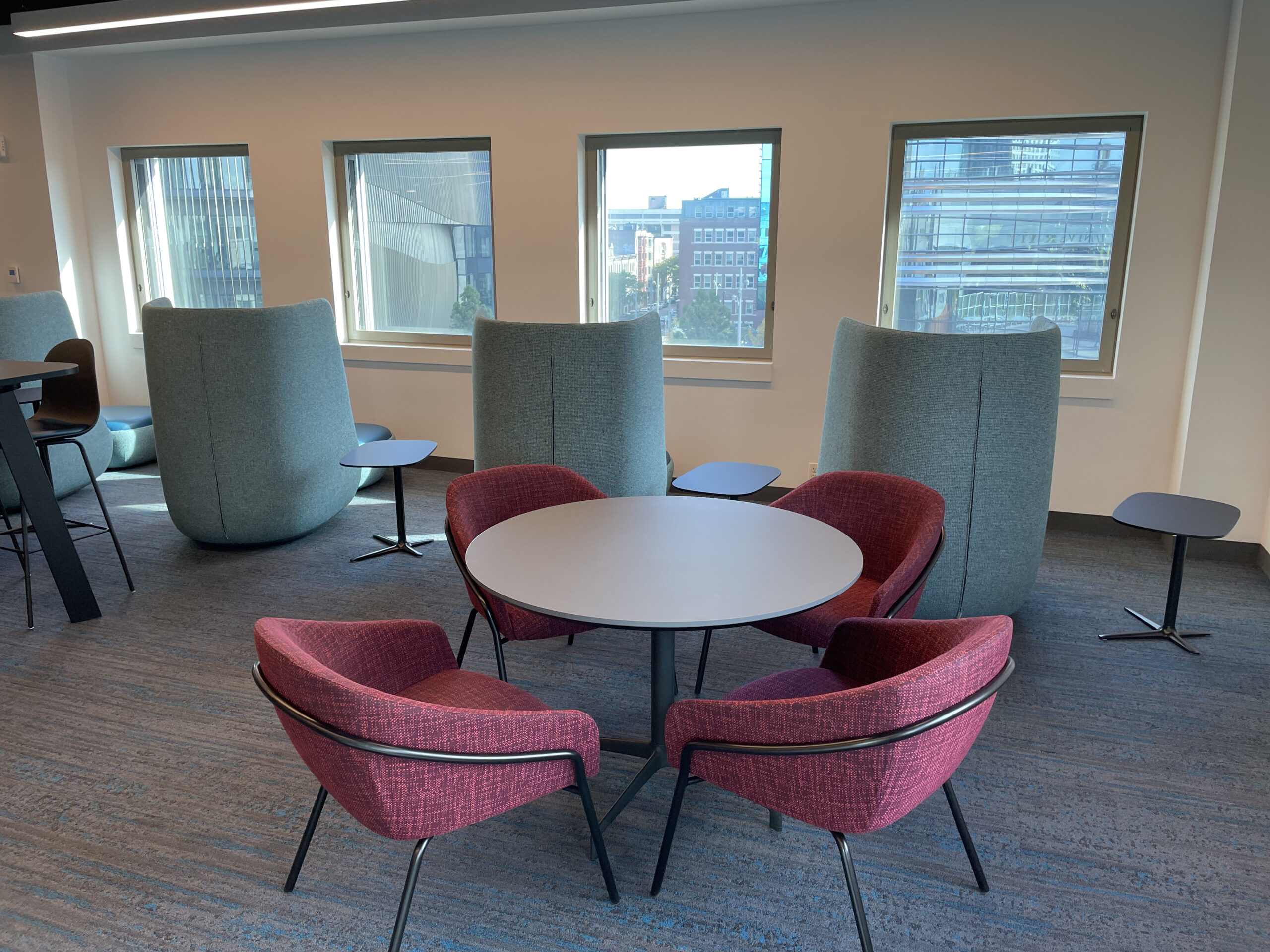
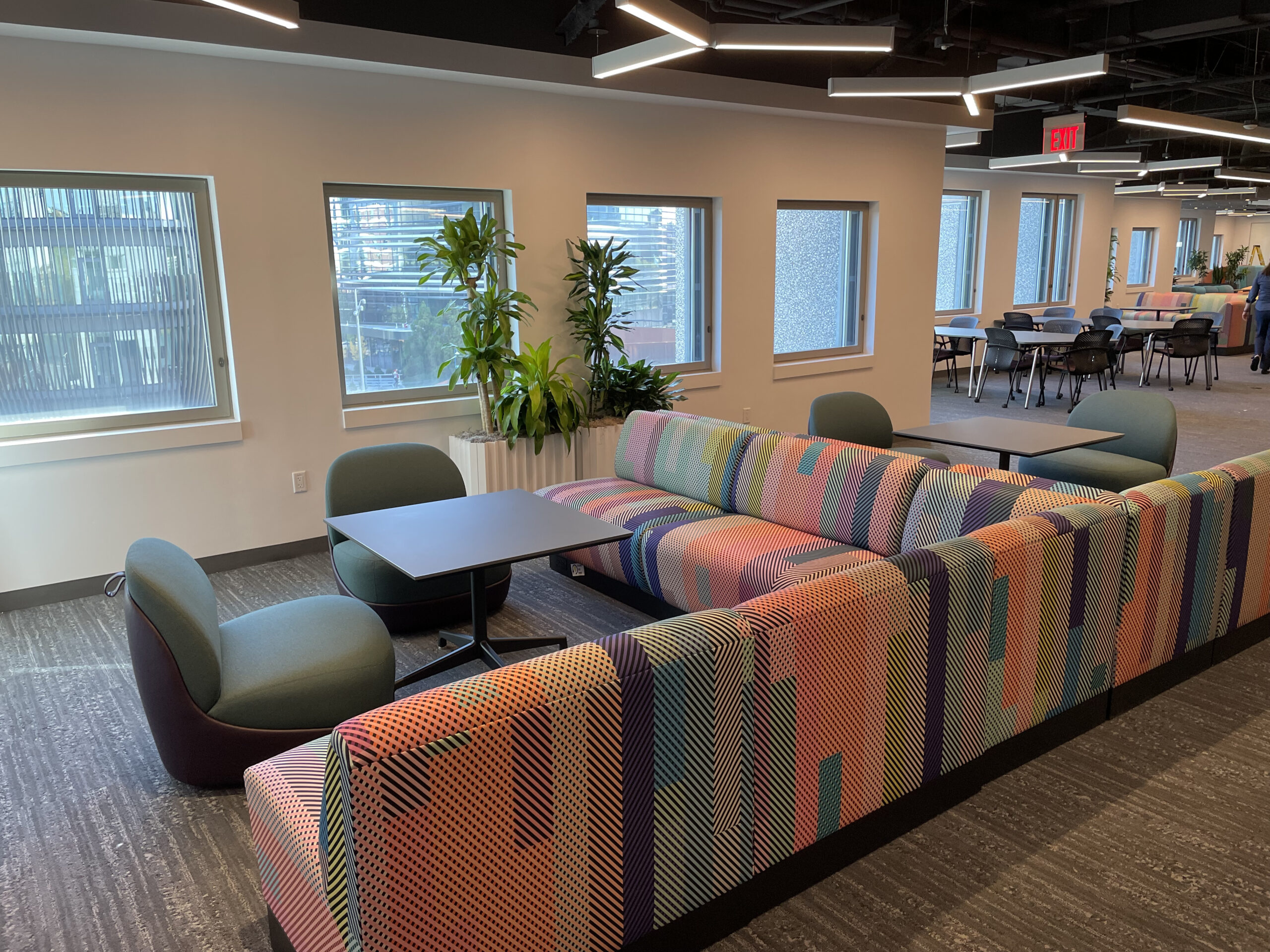
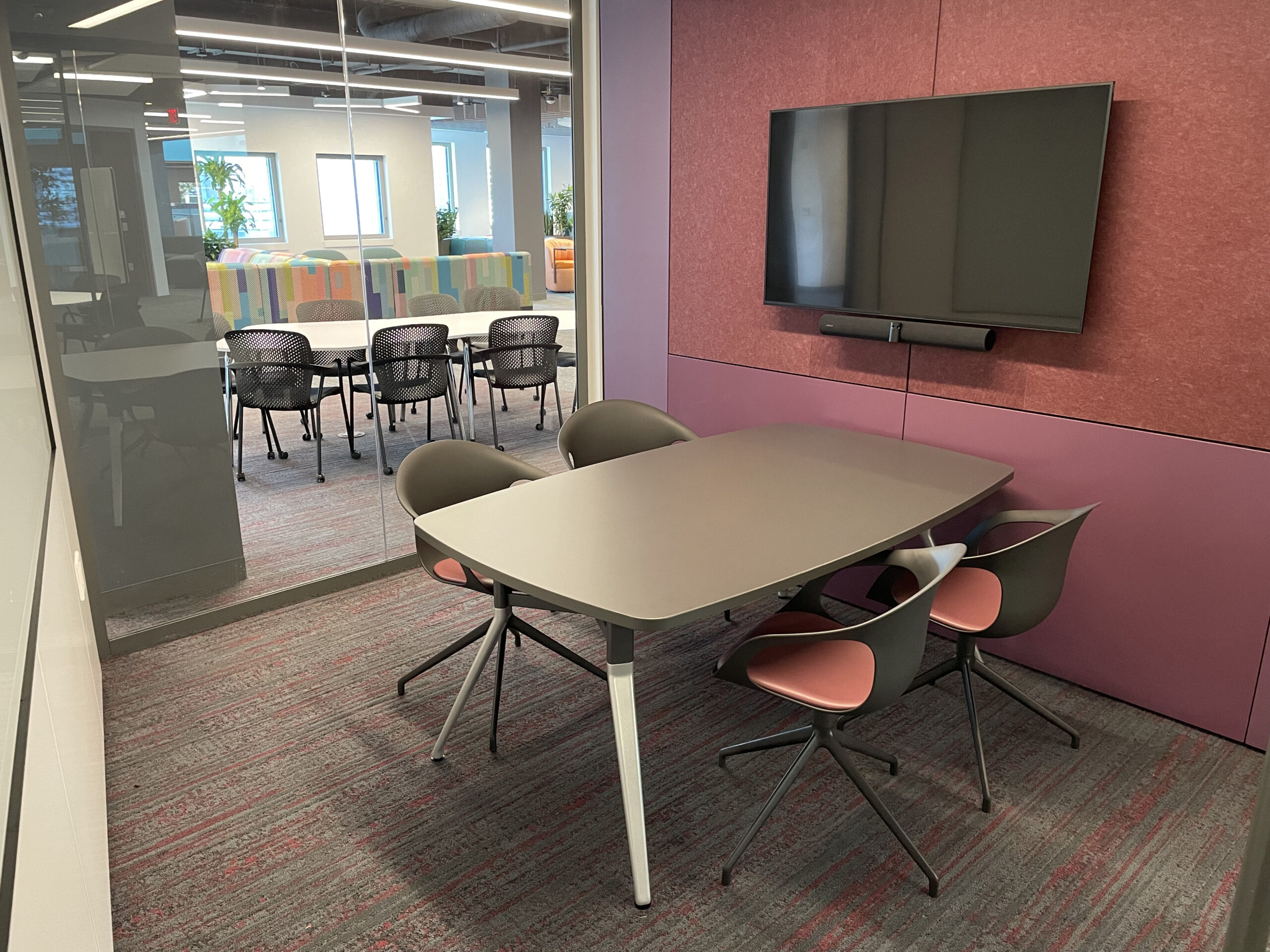
New Hires
The Northeastern University Library recently welcomed these new staff members:
Sahaas Ellis, Evening Weekend Monitor, Oakland
Lisa Fuller, Evening Weekend Monitor, Oakland
Joel Lee, Data Engineer, Boston
Caitlin Pollack, Associate Director of the Digital Scholarship Group, Boston
Joy Zanghi, Civil Rights and Restorative Justice Project Archivist, Boston
Donor Spotlight: Peter G. Manson, DMSB’65
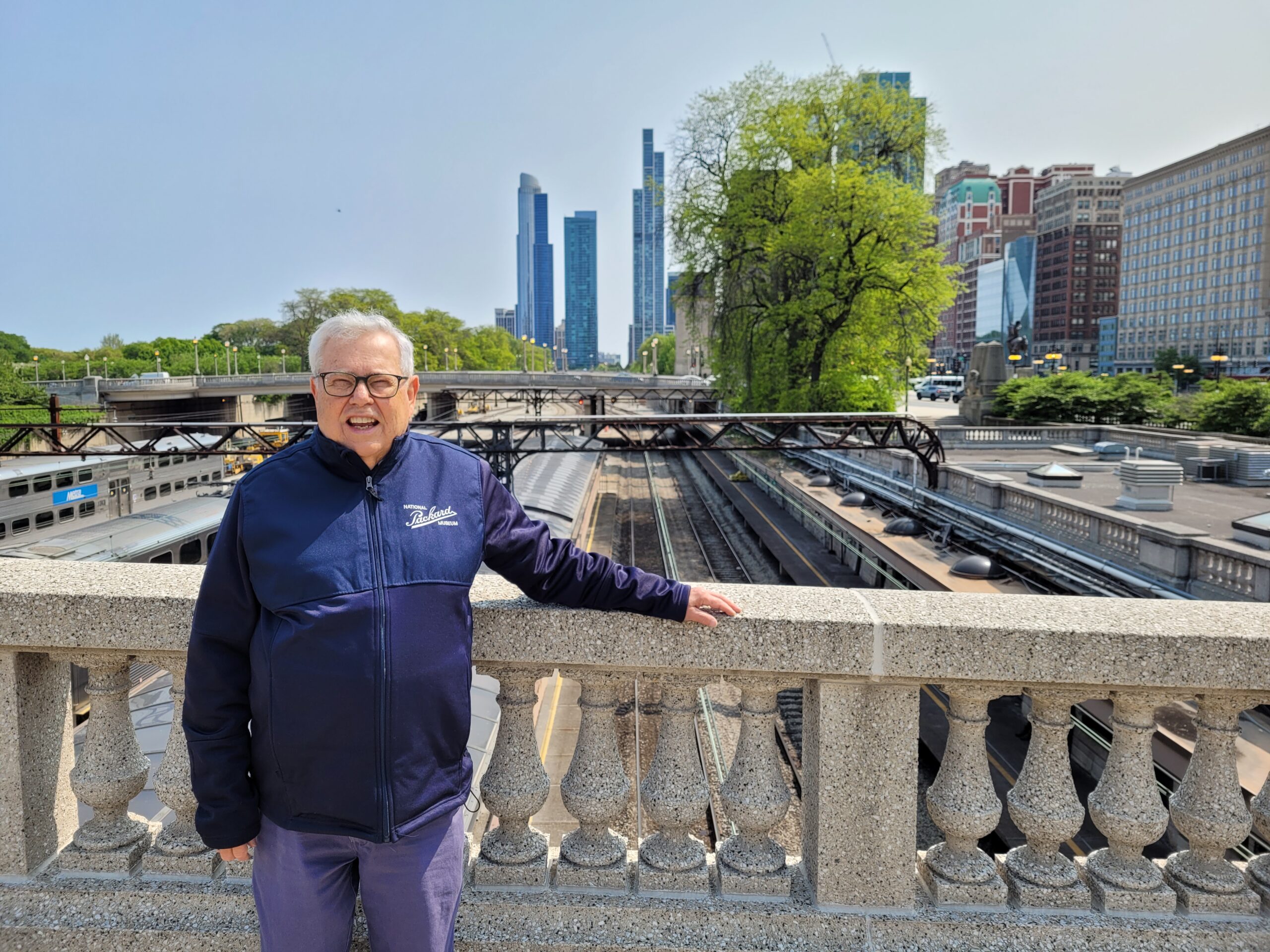
Peter Manson in Chicago in 2023.
When Peter G. Manson, DMSB’65, shares his Northeastern story and talks about his ongoing support of the Northeastern University Library, the joy and excitement in his voice and his body language is unquestionable—it is clear that Northeastern University has filled his life with success and accomplishments, and that his continued involvement with the university continues to bring him pleasure.
Peter grew up in Waban and Weston, Mass., the son of working-class parents. At the family church, Peter met Julio Correa, a vice president of the American Mutual Liability insurance company, who offered him a summer job, which Peter enjoyed throughout his high school breaks. While working there, Eustis Wolcott, another vice president who also served on the Board of Trustees at Northeastern, recommended Peter apply to the university. Peter did so, and after graduating from Weston High School in 1960, he became the first in his family to go to college. Over 60 years later, Peter smiles as he thinks about how different Northeastern is today, exclaiming, “My degree is worth quite a bit more now!”
After beginning his studies at Northeastern, Peter continued working for American Mutual Liability, but now as a co-op. Five years later, he continued working at the company after graduation, and established a co-op there himself. His career in insurance, human resources, and administration took off, and he recounts position after position, salaries and benefits increasing and improving at each stage; traveling around the country; and managing more and more people—all thanks to those initial introductions, the “unparalleled” Northeastern co-op education, and connections he made along the way.
Peter’s affection and strong devotion to libraries started in his childhood. He took weekly class trips to the public library, first in Waban and then in Weston—for both, he remembers the route taken, the streets and landmarks along the way, and the librarians reading stories to the class. Later, his daughter Amy would go on to work at the local public library in Southington, Conn., throughout high school and continue on to pursue her Master of Library Science degree at Simmons University. She is now the Head Librarian at the Faneuil Branch of the Boston Public Library in Brighton. It was Amy who convinced Peter that supporting libraries is crucial.
The centrality of the Northeastern University Library during Peter’s time at the school was of a double nature. First, it was the only place on campus where students could sit and study in peace. Most of the campus was filled with parking lots, and most students were commuters who did not have dorm rooms nearby. Second, the library’s location at the time, in Dodge Hall, made it a central meeting point and viewing spot for Krentzman Quad, the site for all the campus happenings. After all, it was the only place on campus that had any grass. Peter remembers seeing Kingston Trio performing there and witnessing the Mayer of Huntington Avenue competition, along with many other campus activities and dignitary visits.
Today, in addition to supporting the Northeastern University Library through a recurring gift and through a planned estate gift, Peter is also a Northeastern University Ambassador, always on the lookout for a student in a Northeastern t-shirt whose hand he can shake and prospective parents whose worries he can ease by sharing his own Northeastern story. It’s a role he takes very seriously.
“Northeastern was my first choice then and would be my first choice now,” said Peter.
Peter shared that he wants his legacy to be that of enabling the Northeastern University Library to continue and thrive for many years to come and he is well on his way to achieving that goal.
To join Peter in supporting the Northeastern University Library, visit our support page or email Michal Biletzki at [email protected].
Northeastern Archives Helps Commemorate 50th Anniversary of Boston Public Schools Desegregation
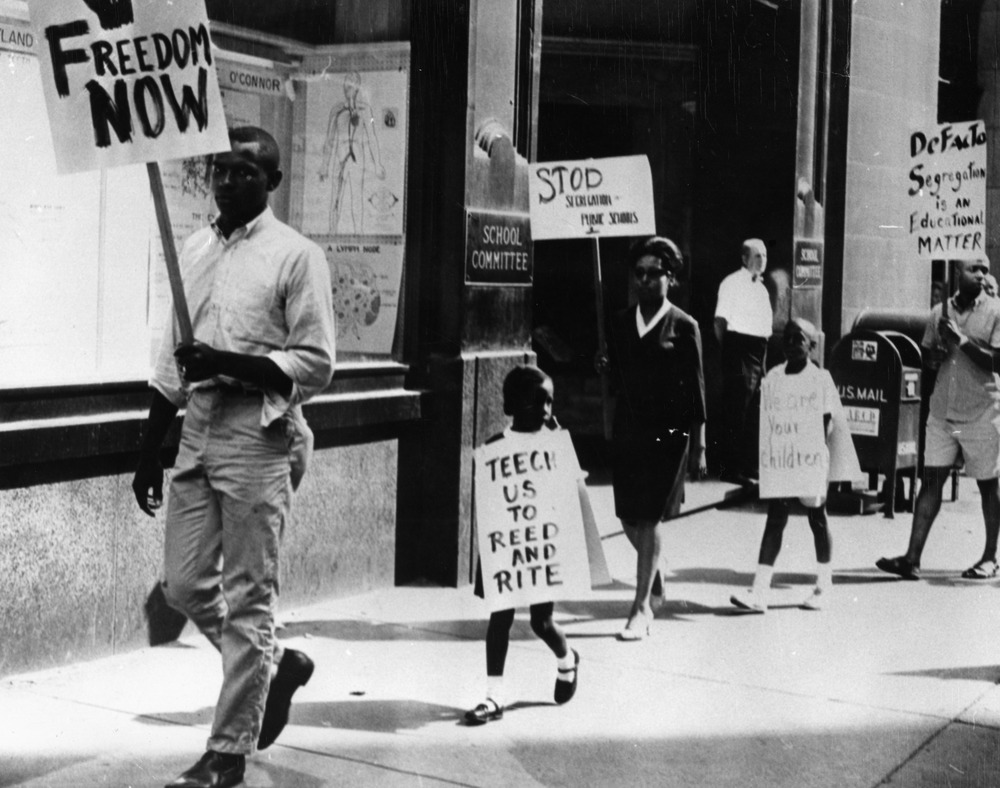
1963 picket line at the Boston School Committee offices
The year 2024 marks the 50th anniversary of the 1974 decision by Judge W. Arthur Garrity that found the Boston Public Schools unconstitutionally segregated. A cohort of historians, activists, teachers, former students, civic leaders, and community members have gathered together as the Boston Desegregation and Busing Initiative (BDBI) for observe this significant anniversary, and the Northeastern University Archives and Special Collections has been working alongside this group to support their work.
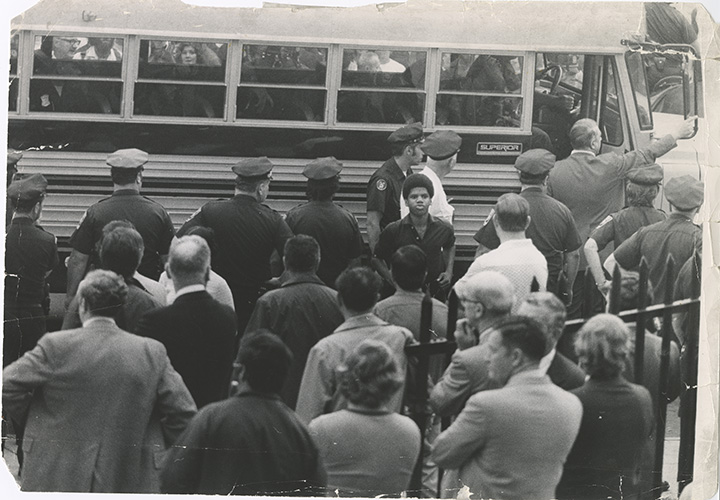
First day of busing at South Boston High on September 12, 1974. Photo by Dan Sheehan, courtesy of the Boston Globe Library Collection
On September 7, at the Massachusetts State House, the BDBI announced their efforts toward increasing conversation, commemoration, and coalition-building around the history of school desegregation in Boston’s public schools. Surrounding the press and attendees gathered at the State House were reproductions of records from the Northeastern University Archives and Special Collections’ many collections documenting the long history of school desegregation and the fight against racial imbalance in Boston Public Schools.
Reference and Outreach Archivist Molly Brown worked with members of the initiative to select photographs and records that were emblematic of the key events and stories of school desegregation, busing, and early education activism. Selected records included flyers advertising Freedom Schools as an opportunity for civil protest; Ruth Bastion’s demands issued on behalf of the NAACP to the Boston School Committee; records of Operation Exodus, the pre-1974 busing organization run by Ellen Jackson; and photos of the many pro-busing and anti-busing protests that took place across the city of Boston, as well as photos of the first days and weeks of busing in 1974 and 1975.
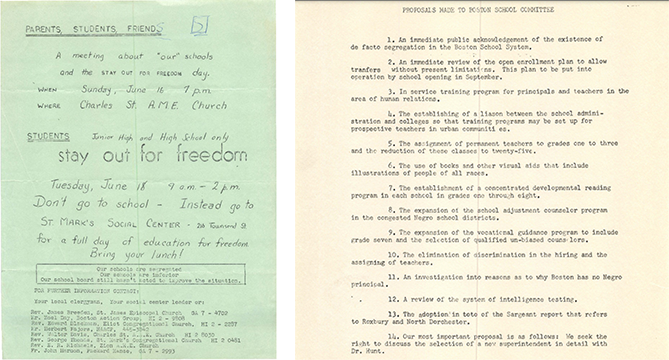
(L) A 1963 flyer about Stay Out for Freedom Day. (R) A 1965 proposal to the Boston School Committee.
These records were selected to spark memory in those that participated and witnessed the long history of school desegregation in Boston. Many of those selected were made available years earlier as part of a 2018 citywide effort by area archives to digitize and make accessible significant records documenting school desegregation and busing history in the city of Boston. Digitization funding and support of this project was provided by the Boston Library Consortium and included the Boston City Archives, UMass Boston, Suffolk University, Boston Collection, and other collaborators with the Northeastern Archives.
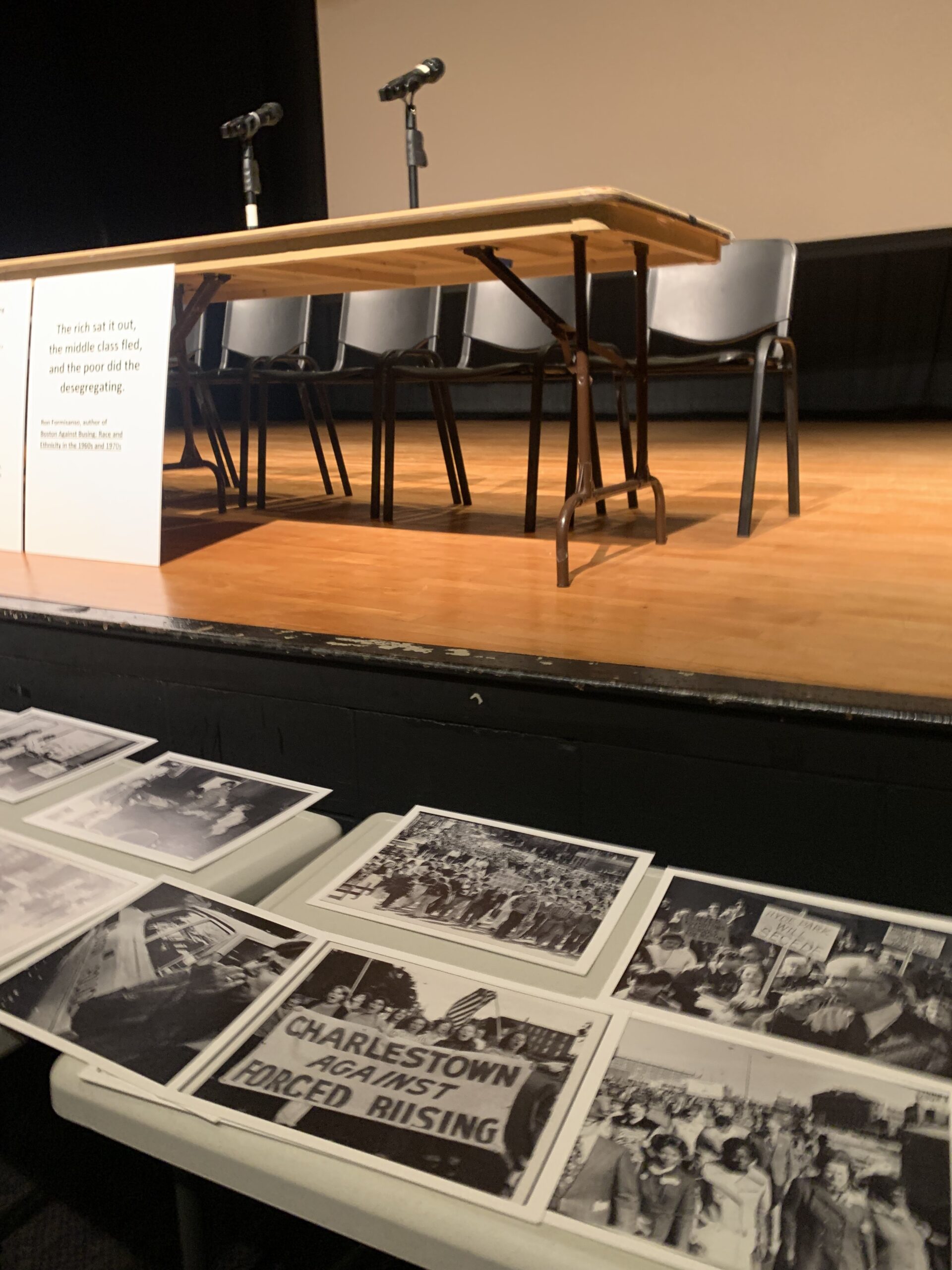 The reproductions’ use at the press conference is only the beginning of their journey, as they will continue to travel with the BDBI to future forums and facilitations. A couple weeks following the press conferences, the archival reproductions were arranged across several tables that lined the stage for the first forum. At this event, former Mayor Kim Janey moderated presentations and conversations from Boston luminaries and activists Jean McGuire and Hubie Jones; educators Myra Peters and Gloria Lee; community activist Charles Glenn; Vernita Carter-Weller, daughter of Reverend Vernon Carter; and historian Zebulon Miletsky.
The reproductions’ use at the press conference is only the beginning of their journey, as they will continue to travel with the BDBI to future forums and facilitations. A couple weeks following the press conferences, the archival reproductions were arranged across several tables that lined the stage for the first forum. At this event, former Mayor Kim Janey moderated presentations and conversations from Boston luminaries and activists Jean McGuire and Hubie Jones; educators Myra Peters and Gloria Lee; community activist Charles Glenn; Vernita Carter-Weller, daughter of Reverend Vernon Carter; and historian Zebulon Miletsky.
Many panelists at the forum observed how important these records are to telling the story of school desegregation. Carter-Weller has been using them to evidence the work and advocacy of her father in his 114-day vigil at the Boston School Committee headquarters.
Archives and special collections have an opportunity to take an active role in supporting memory work and meaning-making when it comes to commemorating significant events and situating them in modern contexts, and providing reproductions for the BDBI is one example of this work.
More forums will take place in 2024, and the Northeastern University Archives and Special Collections are collaborating with other area archives and historians to collaboratively exhibit works on desegregation history in September 2024.